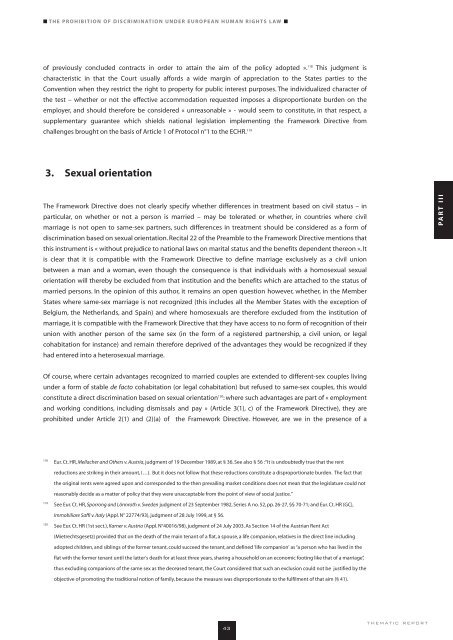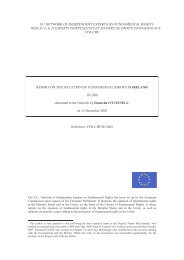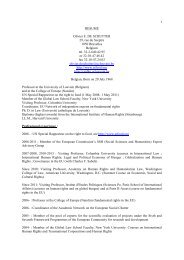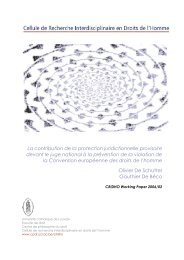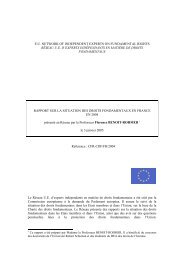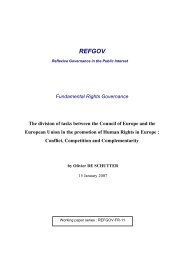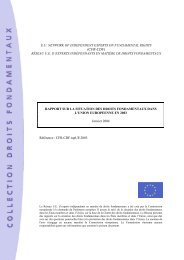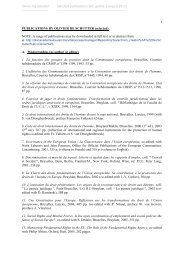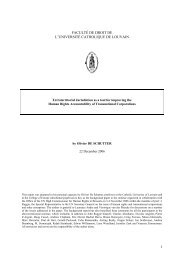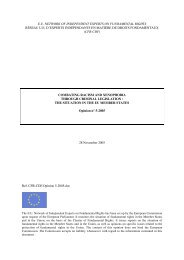The Prohibition of Discrimination under European Human ... - cridho
The Prohibition of Discrimination under European Human ... - cridho
The Prohibition of Discrimination under European Human ... - cridho
Create successful ePaper yourself
Turn your PDF publications into a flip-book with our unique Google optimized e-Paper software.
■ THE PROHIBITION OF DISCRIMINATION UNDER EUROPEAN HUMAN RIGHTS LAW ■<br />
<strong>of</strong> previously concluded contracts in order to attain the aim <strong>of</strong> the policy adopted ». 118 This judgment is<br />
characteristic in that the Court usually affords a wide margin <strong>of</strong> appreciation to the States parties to the<br />
Convention when they restrict the right to property for public interest purposes. <strong>The</strong> individualized character <strong>of</strong><br />
the test – whether or not the effective accommodation requested imposes a disproportionate burden on the<br />
employer, and should therefore be considered « unreasonable » - would seem to constitute, in that respect, a<br />
supplementary guarantee which shields national legislation implementing the Framework Directive from<br />
challenges brought on the basis <strong>of</strong> Article 1 <strong>of</strong> Protocol n°1 to the ECHR. 119<br />
3. Sexual orientation<br />
<strong>The</strong> Framework Directive does not clearly specify whether differences in treatment based on civil status – in<br />
particular, on whether or not a person is married – may be tolerated or whether, in countries where civil<br />
marriage is not open to same-sex partners, such differences in treatment should be considered as a form <strong>of</strong><br />
discrimination based on sexual orientation. Recital 22 <strong>of</strong> the Preamble to the Framework Directive mentions that<br />
this instrument is « without prejudice to national laws on marital status and the benefits dependent thereon ». It<br />
is clear that it is compatible with the Framework Directive to define marriage exclusively as a civil union<br />
between a man and a woman, even though the consequence is that individuals with a homosexual sexual<br />
orientation will thereby be excluded from that institution and the benefits which are attached to the status <strong>of</strong><br />
married persons. In the opinion <strong>of</strong> this author, it remains an open question however, whether, in the Member<br />
States where same-sex marriage is not recognized (this includes all the Member States with the exception <strong>of</strong><br />
Belgium, the Netherlands, and Spain) and where homosexuals are therefore excluded from the institution <strong>of</strong><br />
marriage, it is compatible with the Framework Directive that they have access to no form <strong>of</strong> recognition <strong>of</strong> their<br />
union with another person <strong>of</strong> the same sex (in the form <strong>of</strong> a registered partnership, a civil union, or legal<br />
cohabitation for instance) and remain therefore deprived <strong>of</strong> the advantages they would be recognized if they<br />
had entered into a heterosexual marriage.<br />
Of course, where certain advantages recognized to married couples are extended to different-sex couples living<br />
<strong>under</strong> a form <strong>of</strong> stable de facto cohabitation (or legal cohabitation) but refused to same-sex couples, this would<br />
constitute a direct discrimination based on sexual orientation120 : where such advantages are part <strong>of</strong> « employment<br />
and working conditions, including dismissals and pay » (Article 3(1), c) <strong>of</strong> the Framework Directive), they are<br />
prohibited <strong>under</strong> Article 2(1) and (2)(a) <strong>of</strong> the Framework Directive. However, are we in the presence <strong>of</strong> a<br />
118<br />
119<br />
120<br />
Eur. Ct. HR, Mellacher and Others v. Austria, judgment <strong>of</strong> 19 December 1989, at § 36. See also § 56 :“It is undoubtedly true that the rent<br />
reductions are striking in their amount, (…). But it does not follow that these reductions constitute a disproportionate burden. <strong>The</strong> fact that<br />
the original rents were agreed upon and corresponded to the then prevailing market conditions does not mean that the legislature could not<br />
reasonably decide as a matter <strong>of</strong> policy that they were unacceptable from the point <strong>of</strong> view <strong>of</strong> social justice.”<br />
See Eur. Ct. HR, Sporrong and Lönnroth v. Sweden judgment <strong>of</strong> 23 September 1982, Series A no. 52, pp. 26-27, §§ 70-71; and Eur. Ct. HR (GC),<br />
Immobiliare Saffi v. Italy (Appl. N° 22774/93), judgment <strong>of</strong> 28 July 1999, at § 56.<br />
See Eur. Ct. HR (1st sect.), Karner v. Austria (Appl. N°40016/98), judgment <strong>of</strong> 24 July 2003. As Section 14 <strong>of</strong> the Austrian Rent Act<br />
(Mietrechtsgesetz) provided that on the death <strong>of</strong> the main tenant <strong>of</strong> a flat, a spouse, a life companion, relatives in the direct line including<br />
adopted children, and siblings <strong>of</strong> the former tenant, could succeed the tenant, and defined 'life companion' as “a person who has lived in the<br />
flat with the former tenant until the latter's death for at least three years, sharing a household on an economic footing like that <strong>of</strong> a marriage”,<br />
thus excluding companions <strong>of</strong> the same sex as the deceased tenant, the Court considered that such an exclusion could not be justified by the<br />
objective <strong>of</strong> promoting the traditional notion <strong>of</strong> family, because the measure was disproportionate to the fulfilment <strong>of</strong> that aim (§ 41).<br />
43<br />
thematic report<br />
PART III


